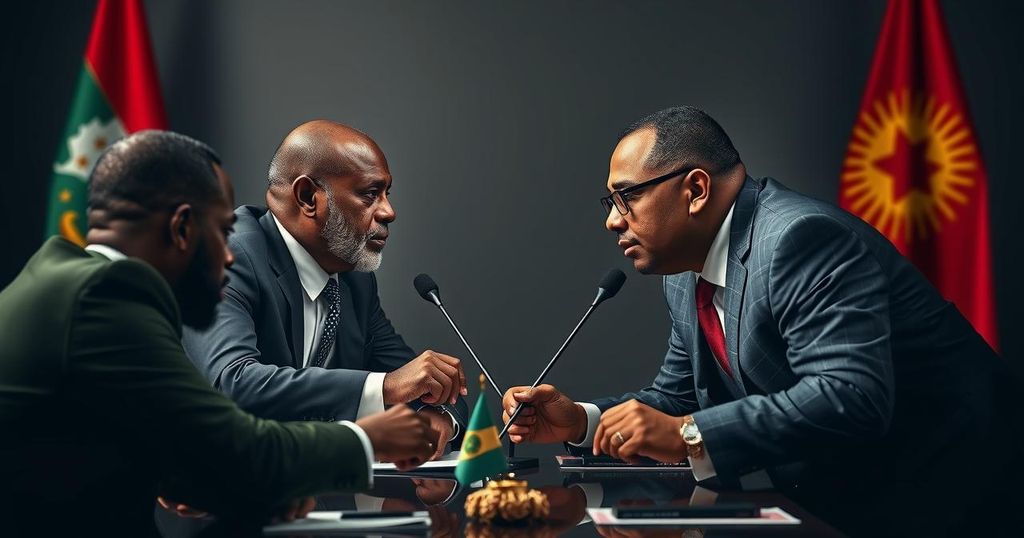Afwerki: Eritrea Seeks Stability, Rejects Anti-Ethiopia Coalition Claims

Eritrean President Isaias Afwerki denied allegations of forming an anti-Ethiopia coalition during the Tripartite summit in Asmara, describing such claims as propaganda. He emphasized Eritrea’s commitment to regional stability and cooperation, while also addressing Ethiopia’s internal ethnic tensions and border issues. Afwerki condemned foreign disinformation campaigns and reiterated support for Sudan’s peace efforts, highlighting the complexities of regional geopolitics.
In a recent statement, Eritrean President Isaias Afwerki asserted that the recent Tripartite summit in Asmara did not target the Ethiopian federal government. He characterized allegations of an anti-Ethiopia axis involving Eritrea, Somalia, and Egypt as mere propaganda designed to create anxiety and mistrust within the Horn of Africa. President Afwerki emphasized that Eritrea is committed to maintaining regional stability and has no interest in destabilizing Ethiopia.
He expressed concern over escalating tensions between Ethiopia and Somalia, which have arisen as a result of Ethiopia’s agreements with Somaliland regarding Red Sea access. Egypt’s increasing involvement, particularly its proposed leadership of the African Union Support and Stabilization Mission in Somalia, was noted as a strategic move aimed at countering Ethiopian influence. This development coincides with Egypt’s pledge to support Somalia’s sovereignty against Ethiopia’s territorial claims.
President Afwerki condemned what he termed “foreign-backed disinformation campaigns” that threaten to exacerbate conflicts in the region. He criticized Ethiopia’s 1994 constitution for its flaws and pointed to ongoing ethnic strife within Ethiopia, particularly concerning Amhara and Tigray regions, as evidence of Ethiopia’s failure to achieve stabilization. He linked the border skirmishes between Eritrea and Ethiopia to external interference, referencing the Tigray People’s Liberation Front’s attacks on Eritrea as indications of destabilizing influences.
The interview also highlighted Eritrea’s commitment to fostering peace in Sudan. Despite the complex dynamics involving Ethiopia, Afwerki indicated that Eritrea would continue to support Sudanese efforts toward conflict resolution, stressing that the solution lies within the Sudanese populace. This underscores Eritrea’s diplomatic position within the region.
In conclusion, President Isaias Afwerki’s statements reflect Eritrea’s commitment to regional stability and cooperation among Horn of Africa nations. He challenges allegations of an anti-Ethiopia coalition while addressing the internal challenges faced by Ethiopia and reaffirming Eritrea’s historical ties to Sudan. The intricate geopolitical relationships continue to evolve, with ongoing considerations of territorial integrity and sovereignty in the region.
The Horn of Africa remains a region of significant geopolitical importance, influenced by various historical, ethnic, and political dynamics. Recent developments have heightened tension between countries, primarily due to Ethiopia’s ambitions in the Red Sea and its controversial dealings with Somaliland, a breakaway region that seeks independence. Eritrea’s strategic partnerships with Somalia and Egypt create a complex web of alliances that could alter the balance of power in the region. Additionally, Ethiopia’s ongoing internal conflicts, particularly the ethnic tensions stemming from its federal constitution, further complicate its relationships with neighboring countries. Eritrea’s historical animosities with Ethiopia, coupled with external interventions, play a crucial role in shaping the regional landscape. Overall, the evolving relationships and the actions of external actors are crucial for understanding the potential pathways toward stability or conflict in the Horn of Africa.
President Isaias Afwerki’s assertions highlight Eritrea’s focus on regional stability and cooperation rather than conflict with Ethiopia. He refutes claims of an anti-Ethiopia coalition, advocating for diplomatic relations and emphasizing internal challenges within Ethiopia that should be addressed. His comments about supporting Sudan demonstrate Eritrea’s awareness of the broader regional implications of conflict and cooperation among neighboring states. The interplay between Ethiopia, Eritrea, and their regional allies continues to be a critical component in the assessment of peace and security in the Horn of Africa.
Original Source: www.garoweonline.com








